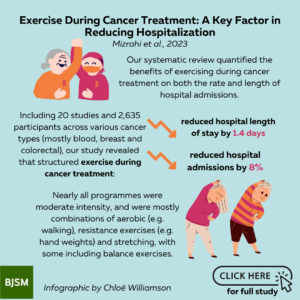Authors: David Mizrahi, Jonathan Lai, Hayley Wareing, Yi Ren, Tong Li, Christopher Swain, David Smith, Diana Adams, Alexandra Martiniuk, Michael David
In this blog post, we explore the impact of exercise on hospitalization rates during cancer treatment, shedding light on the potential benefits for both patients and health systems. Our recent study, published in BJSM, delves into evidence from various studies providing exercise programs to patients undergoing chemotherapy, radiotherapy, or stem cell transplant protocols. We quantify how exercise reduces the risk of hospital admission and calculate the corresponding decrease in days spent admitted.
Why is this study important?
Exercise has demonstrated its ability to enhance the quality of life, functional capacity, cardiorespiratory fitness, and reduce symptom burden in cancer patients. However, few studies have investigated its impact on clinical outcomes such as hospitalization rates. This is crucial as patients with lower fitness levels and strength may experience increased toxicity and adverse events, leading to extended and costly hospital stays, potentially resulting in worse clinical outcomes.
The exercise oncology field has rapidly gained recognition in recent years, with numerous organizations promoting exercise and physical activity during and after cancer treatment. Despite this, most cancer centers do not offer exercise programs, leaving patients with low levels of exercise and presenting a clear gap in care. Our study contributes to the expanding exercise oncology literature by quantifying the benefits of exercising during cancer treatment on both the rate and length of hospital admissions.
How did the study go about this?
Our approach involved a performing a systematic review and meta-analysis of published articles from four medical databases. We compared hospital length of stay in studies that randomized patients to received exercise programs, which was compared to those who did not receive exercise guidance.
What did the study find?
Our study, encompassing twenty studies and 2,635 participants across various cancer types (mostly blood, breast and colorectal), revealed that structured exercise during cancer treatment:
- Reduced hospital length of stay by 1.4 days
- Reduced hospital admissions by 8%
Greatest Benefits in Blood Cancer Patients:
Patients with blood cancers undergoing lengthy stem cell transplant treatment protocols experienced the most significant benefits, with a 1.55-day reduction in hospital stay.
Safety and Tailoring of Exercise Programs:
There were a variety of exercise programs included, mostly combinations of aerobic (e.g. cycling, walking), resistance exercises (e.g. resistance bands, hand weights) and stretching, with some including balance exercises. Most programs included a one-on-one supervised component from an exercise professional (e.g. physiotherapist, exercise physiologist) with few including group-based classes. Nearly all were delivered at moderate intensity.
There was a low rate of adverse events across studies, emphasizing the safety of supervised exercise programs during treatment. No key differences in exercise program characteristics were identified regarding hospital length of stay. Patient-centred exercise programs that are tailored to clinical characteristics, exercise history, and preferences leads to the best adherence and should be encouraged, particularly during treatment.
What are the key take-home points?
Exercise during cancer treatment significantly decreases hospital length of stay and admissions. When applied across large patient populations, these reductions can contribute to reduced health system costs while concurrently providing therapeutic benefits to patients. While exercise is included in some multidisciplinary care plans, its consideration as standard practice for patients is recommended as cancer care pathways evolve.
Author and Affiliations:
David Mizrahi, Jonathan Lai, Hayley Wareing, Yi Ren, Tong Li, Christopher Swain, David Smith, Diana Adams, Alexandra Martiniuk, Michael David
Dr David Mizrahi, The Daffodil Centre, The University of Sydney, a joint venture with Cancer Council NSW, Sydney, New South Wales, Australia
